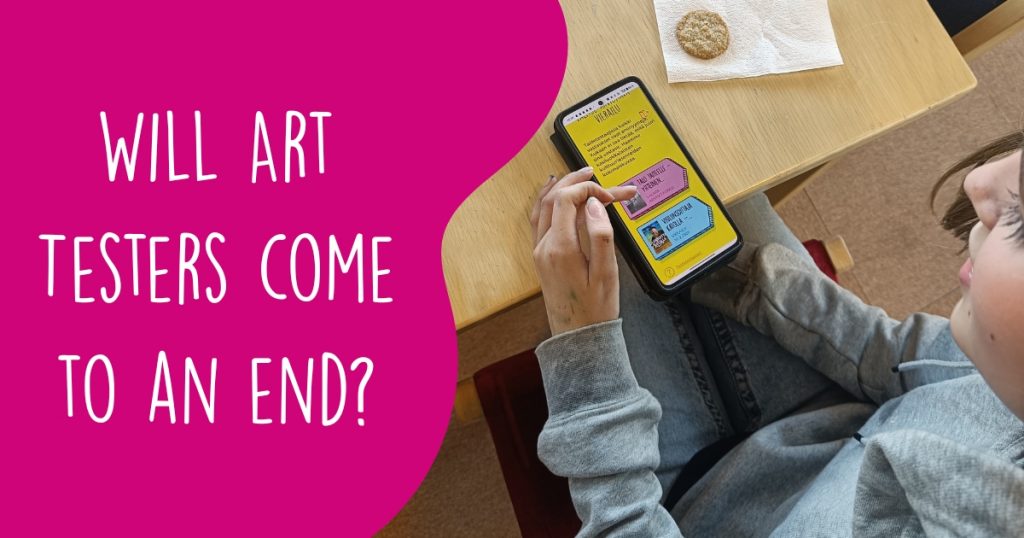Art Testers Programme at Risk as Foundation Funding Ends in 2027
14.10.2025

The continuation of Finland’s Art Testers cultural education programme is now in jeopardy. The Finnish Cultural Foundation and the Swedish Cultural Foundation in Finland, which have funded the programme since its inception, have announced that their support will end after summer 2027. For the programme to continue beyond that point, state funding is essential.
Launched in autumn 2017 as part of the Finnish Cultural Foundation’s Finland 100 initiative, the Art Testers programme gives every Year 8 pupil in Finland the chance to experience professional art as part of their school day. The Swedish Cultural Foundation in Finland joined as co-funder from the very beginning. Following the first three years, the Ministry of Education and Culture became a third funding partner, as approved by Parliament. This state partnership lasted four years but was not renewed, meaning that since autumn 2024, the programme has once again been funded solely by the two private foundations. They have committed to continuing support until summer 2027. After that, Art Testers will need to be included in the state budget – or it will come to an end.
Over the past eight school years, more than half a million young people have taken part in art visits through the programme. To date, pupils and their teachers have made over 920,000 visits, with the one-million mark expected to be reached during the 2025–2026 school year. The Taidetestaajat.fi website already hosts more than 300,000 art reviews written by young people.
Proven Societal Impact
A report on the programme’s impact, published in September 2025 by MDI Public, highlights Art Testers as a significant societal actor. According to the report, the programme promotes young people’s wellbeing, participation, sense of hope and democratic skills, while also supporting arts education in schools and generating work for artists, guides and performers. It brings new audiences to the arts on an unprecedented scale and strengthens cooperation between schools and cultural institutions.
Art Testers directly advances the goals set out in Finland’s Cultural Policy Report (2024) and aligns with the objectives of the Basic Education Act, such as promoting equality and cultural awareness. It also supports Article 31 of the UN Convention on the Rights of the Child – the right to participate in cultural and artistic life. The programme has been recognised with several awards, including the Sivistysala ry “For Education” Award (2023) and an honourable mention in the Ministry of Justice’s Democracy Award (2022).
The programme’s wider impact is also considerable: it supports municipal cultural education plans and provides unique feedback data that helps the arts sector better understand young audiences.
Time for the State to Step In
Art Testers has been developed into a cost-effective model, with the average cost per pupil (including travel) at €54 per visit and administration accounting for around 10% of expenses. By spring 2027, the Finnish Cultural Foundation and the Swedish Cultural Foundation in Finland will have invested nearly €56 million in developing and running the programme.
It is now time for the Finnish state to take responsibility for ensuring access to arts and culture within basic education – a responsibility that would require an annual budget of up to €7 million. A decision on future state funding would need to be made already during the spring 2026 budget session, to avoid the risk of the programme being scaled down from autumn 2026.
The situation in the cultural sector is challenging across the board, and the cuts to culture have been extensive. Funding for the Art Testers programme could come not only from the culture budget, but also, for example, from the basic education budget. Alternatively, it could be regarded as a comprehensive initiative under the Ministry of Education and Culture – or even as an inter-ministerial undertaking. According to a school survey conducted in spring 2025, fewer than one in five schools would have organised art trips without the programme.
If the Art Testers programme is discontinued, Finland would lose a highly valued and award-winning part of its basic education system and cultural landscape. It would also undermine the goals of the national Cultural Policy Report and the Basic Education Act, weaken local cultural education efforts and deprive young people of something they both need and deserve – meaningful encounters with art during a formative stage in their lives.
Related articles
New Report: The Art Testers Programme Has Wide-Ranging Impacts on Society